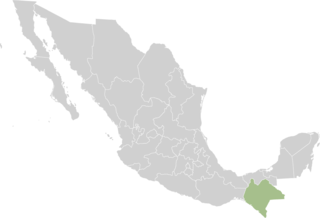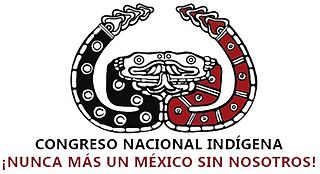The Acteal massacre was a massacre of 45 people attending a prayer meeting of Roman Catholic indigenous townspeople, including a number of children and pregnant women, who were members of the pacifist group Las Abejas, in the small village of Acteal in the municipality of Chenalhó, in the Mexican state of Chiapas. It was carried out on December 22, 1997, by the right-wing paramilitary group Mascara Roja, or Red Mask.

Samuel Ruiz García was a Mexican Roman Catholic prelate who served as bishop of the Diocese of San Cristóbal de las Casas, Chiapas, from 1959 until 1999. Ruiz is best known for his role as mediator during the conflict between the Zapatista Army of National Liberation (EZLN) and the Institutional Revolutionary Party (PRI), a Mexican political party which had held power for over seventy years, and whose policies were often disadvantageous to the indigenous populations of Chiapas. Inspired by Liberation Theology, which swept through the Roman Catholic Church in Latin America after the 1960s, Ruiz’s diocese helped some hundreds of thousands of indigenous Maya people in Chiapas who were among Mexico’s poorest marginalized communities.
Pietro Ameglio is an Uruguayan-born naturalized Mexican citizen and Gandhian civil rights and peace activist best known for his role in promoting nonviolence and creating a movement for peace and anti-militarism in Mexico.
The Sixth Declaration of the Lacandon Jungle was a manifesto issued by the Zapatista Army of National Liberation on June 28, 2005, declaring their principles and vision for Mexico and the world.
Subcomandante Elisa is a Zapatista activist who, before her arrest and the revelation of her identity, was a subcomandante in Mexico's Zapatista Army of National Liberation. Her arrest has been considered illegal, and her detention and indictment, controversial. In February 1996, the Human Rights Watch published that the police had arrested María Gloria Benavides, at approximately 4:15 pm on February 8, 1995 after they raided her home in Mexico City. She was acquitted of all charges on November 1.
The Zapatista Anthem is the anthem of the Zapatista Army of National Liberation (EZLN), a political group which launched a rebellion in the Mexican state of Chiapas on 1 January 1994. The music was taken from a Mexican Revolution corrido "Carabina 30-30".

Comandanta Ramona was the nom de guerre of an officer of the Zapatista Army of National Liberation (EZLN), a revolutionary indigenous autonomist organization based in the southern Mexican state of Chiapas. Perhaps the most famous female Zapatista actor, Ramona was one of seven female commanders in charge of directing an army that consisted of one-third women. A member of the Zapatista leading council, the CCRI, she served as a symbol of equality and dignity for indigenous and impoverished women.

A Place Called Chiapas is a 1998 Canadian documentary film of first-hand accounts of the Ejército Zapatista de Liberación Nacional (EZLN) the and the lives of its soldiers and the people for whom they fight. Director Nettie Wild takes the viewer to rebel territory in the southwestern Mexican state of Chiapas, where the EZLN live and evade the Mexican Army.
The San Andrés Accords are agreements reached between the Zapatista Army of National Liberation and the Mexican government, at that time headed by President Ernesto Zedillo. The accords were signed on February 16, 1996, in San Andrés Larráinzar, Chiapas, and granted autonomy, recognition, and rights to the indigenous population of Mexico.

Neozapatismo or neozapatism is the Mexican ideology behind movements such as the Zapatista Army of National Liberation. The official anthem of Neozapatismo and the Zapatista territories is the Himno Zapatista. The ideology is based on anarchism, Mayan tradition, Marxism, the thoughts of Emiliano Zapata, and the thoughts of Subcomandante Insurgente Galeano. Neozapatismo is the ideology of the Zapatistas, who govern a large territory in Chiapas and have since the beginning of the Chiapas conflict. Neozapatismo has no official founder, but its thoughts are mainly attributed to Subcomandante Insurgente Galeano and Emiliano Zapata. The Neozapatista ideology is believed to be derived largely from libertarian socialism, libertarian Marxism, social anarchism, anarcho-communism, anarcho-collectivism, anarcho-syndicalism, communalism, direct democracy, and radical democracy.

The Chiapas conflict refers to the 1994 Zapatista Uprising, the 1995 Zapatista Crisis and their aftermath, and tensions between the indigenous peoples and subsistence farmers in the Mexican state of Chiapas from the 1990s to the present day.

Rafael Sebastián Guillén Vicente is a Mexican insurgent and former military leader and spokesman of the Zapatista Army of National Liberation (EZLN) during the Chiapas conflict. better known by his previous nom de guerre as Subcomandante Marcos, however he has recently used several other pseudonyms; he referred to himself as Delegate Zero during the 2006 Mexican Presidential Campaign, and in May 2014 announced that Subcomandante Marcos "no longer exists," adopting the name of his dead comrade "Teacher Galeano", naming himself Subcomandante Galeano instead.
Radio Insurgente is the official voice of the Zapatista Army of National Liberation (EZLN).The radio station has been operating since August 2003 and it is independent from the Mexican government. Its broadcasting location is unknown. Radio Insurgente's content is focused on promoting the ideas and struggles of the Zapatista movement. Radio Insugente transmits programs in Spanish and in the indigenous languages tzotzil, tzeltal, chol and tojolabal. According to their website, they transmit "from various places in Chiapas directed to the Zapatista bases, the insurgentes and milicians, the commanders and local people in general". No new programs have been posted on the website since 2009, but CDs are on sale on the site and users can listen to previous content. Some argue that Radio Insurgente broadcasts daily on the FM dial — "an hour long short-wave program Friday afternoon at 3:00 PM Zapatista time to the rest of the world"
Zapatista Coffee Cooperatives primarily operate in Chiapas, the southernmost state of Mexico following Zapatismo ideology.

Women have been influential in the Zapatista Army of National Liberation (EZLN) Ejército Zapatista de Liberación Nacional, a revolutionary leftist group in Chiapas, Mexico, by participating as armed insurgents and civil supporters. In the 1990s, one-third of the insurgents were women and half of the Zapatista support base was women. The EZLN organization style involved consensus and participation by everyone, including women and children. Therefore, one aspect of the EZLN's ideology was gender equality and rights for women. After the Zapatista uprising in Chiapas, the EZLN announced the Women's Revolutionary Law which was a set of ten laws that granted rights to women regarding marriage, children, work, health, education, political and military participation, and protected women from violence. Prominent figures who joined the movement early on such as Comandante Ramona and Major Ana Maria encouraged other women to join the Zapatistas.

Rebel Zapatista Autonomous Municipalities are territories controlled by the Neo-zapatista support bases in the Mexican state of Chiapas, founded in December 1994.

María de Jesús Patricio Martínez, also known as Marichuy, is a traditional medicine healer and a human rights activist from the Nahua tribe in Mexico. She was chosen as "representative indigenous spokeswoman" by National Indigenous Congress (CNI) for the 2018 general election, for which she ran as an independent candidate for the Presidency of Mexico.

The National Indigenous Congress is an organization of communities, nations, towns, neighbourhoods and indigenous tribes of Mexico. In its own words, the CNI is "... a space of unity, reflection and organization of the indigenous peoples of Mexico, promoting the integral reconstitution of the original peoples and the construction of a society in which all cultures, all the colors, all the towns that we are Mexico". Since its foundation, among several activities, five national congresses have been held.
Zapatourism is a touristic phenomenon in the Mexican state of Chiapas caused by the presence of the Zapatista Army of National Liberation. International and national tourists visit the area attracted by the message, image or policy of the Zapatista movement which claims to provide autonomy, dignity and freedom of the local indigenous communities. The rebel communities and municipalities in the zone are the entrance to this anti-globalization movement, phenomenon which is also called "political tourism".











